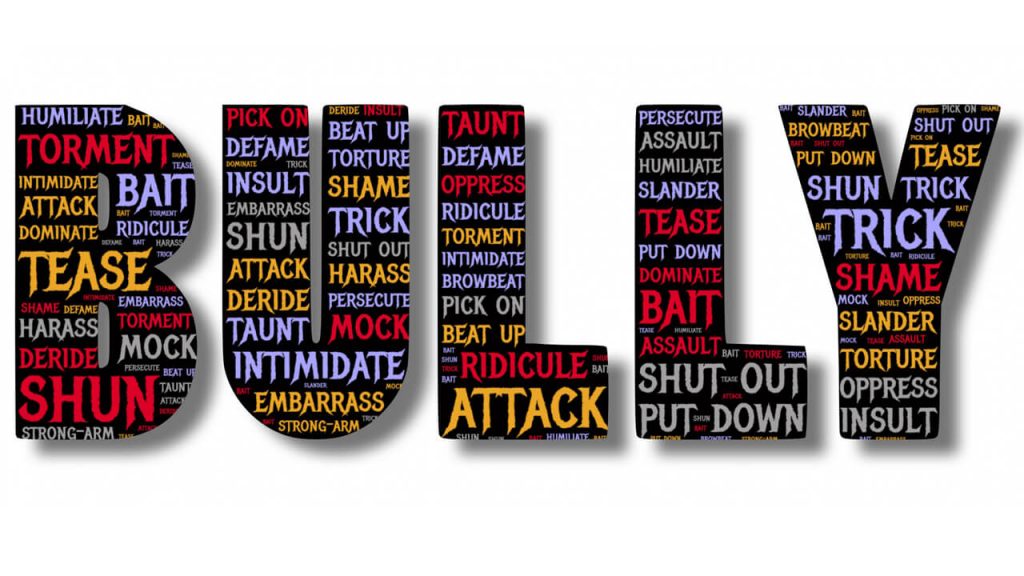National Bullying Prevention Month: Issue affects children and adults

By Natalie Oleson, MSW, LICSW, JFCS Counselor, and
Leah Persky, Ph.D, JFCS Family Life Education Program Manager
October is National Bullying Prevention Month, which is timely, since kids are typically just getting settled into school. Bullying can be categorized in a number of ways, including verbal, social, and physical bullying. Verbal bullying includes teasing, name-calling, taunting, and threatening. Social bullying includes leaving someone out intentionally, convincing others not to be friends with someone, spreading rumors, or embarrassing someone in public. Physical bullying is hurting someone’s body or possessions. Bullying usually happens in a school setting, although it can also happen at home or in the community. Bullying can also happen online, while using technology (texting, e-mailing, or instant messaging) or social media. Ultimately, bullying creates an imbalance of power. The perpetrator/bully is attempting to control the victim.

Leah Persky

Natalie Oleson
Even if your child is not directly involved in bullying, there are other ways they can be involved. Kids can enable bullying, even if they are not the leader. Kids can inadvertently reinforce bullying by providing an audience. They may laugh or otherwise react positively, which encourages the bullying behavior. Outsiders are separate from the situation, and may not outwardly react. They may be aware of the bullying, but do not know how to help or intervene. According to StopBullying.gov, bystanders can stop bullying MORE effectively than the child who is being bullied. Finally, kids who defend can comfort or shield the child who is being bullied. This is very important to remember, since often there are multiple bystanders in any bullying interaction.
Minnesota has a policy about bullying that all public schools need to follow. The Minnesota Department of Education’s website also addresses bullying, and has some tips for parents of kids who are being bullied. It suggests talking to the school first. If the behavior is not adequately addressed, they suggest contacting a district administrator, the superintendent, or the school board.
So, as a parent, what can you do? It is important to talk to your child about all of these different roles kids can play. Parents can be the best tools for prevention, so it is important to address it early and often. Talk to your kids about what bullying looks like. Also, discuss strategies to help kids be “more than a bystander” if they see someone being victimized. Always encourage your children to talk to you, a teacher, or another safe adult about what is happening.
Finally, pay attention to who is influencing your child’s behavior at home. Do adults or other children yell, insult, or otherwise harshly criticize others? These are behaviors that they may use to bully others at school. Set a good example for your children by addressing these behaviors as they happen. If you believe your child is either bullying others or being bullied, speak to a mental health professional or your pediatrician to get your child some support.
It is important to keep in mind that children are not the only victims of bullying. Adult bullies are often more subtle and harder to catch. They are also more likely to engage in verbal, rather than physical abuse. More than 38 percent of American workers have experienced or witnessed bullying behaviors at work according to the Workplace Bullying Institute. Women make up 66 percent of the victims of adult bullying and 70 percent of all adult bullies are male according to the same source. Adults who are bullied can suffer from high levels of stress and mental ill-health. If you witness bullying or are the target of bullying as an adult, be sure you are never alone with the perpetrator, avoid them when at all possible, document the situation and confide in your supervisor or human resources.
JFCS offers counseling services for adults and children of all ages. For more information, call our intake department at 952-546-0616, or click here. We also have a Family Life Education program that can provide trainings for teachers, employees, administrators, students, or parents on a variety of topics, including bullying. Click here for a complete list of courses offered, or for more information, e-mail Leah Persky, Ph.D, at LPersky@jfcsmpls.org.
Additional resources:
PACER’s National Bullying Prevention Center
KidsHealth.org